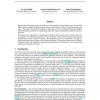Free Online Productivity Tools
i2Speak
i2Symbol
i2OCR
iTex2Img
iWeb2Print
iWeb2Shot
i2Type
iPdf2Split
iPdf2Merge
i2Bopomofo
i2Arabic
i2Style
i2Image
i2PDF
iLatex2Rtf
Sci2ools
119
click to vote
COLT
2010
Springer
2010
Springer
Efficient Classification for Metric Data
Recent advances in large-margin classification of data residing in general metric spaces (rather than Hilbert spaces) enable classification under various natural metrics, such as edit and earthmover distance. The general framework developed for this purpose by von Luxburg and Bousquet [JMLR, 2004] left open the question of computational efficiency and providing direct bounds on classification error. We design a new algorithm for classification in general metric spaces, whose runtime and accuracy depend on the doubling dimension of the data points. It thus achieves superior classification performance in many common scenarios. The algorithmic core of our approach is an approximate (rather than exact) solution to the classical problems of Lipschitz extension and of Nearest Neighbor Search. The algorithm's generalization performance is established via the fat-shattering dimension of Lipschitz classifiers.
COLT 2010 | General Metric Spaces | Machine Learning | Superior Classification Performance | Various Natural Metrics |
Related Content
| Added | 10 Feb 2011 |
| Updated | 10 Feb 2011 |
| Type | Journal |
| Year | 2010 |
| Where | COLT |
| Authors | Lee-Ad Gottlieb, Leonid Kontorovich, Robert Krauthgamer |
Comments (0)

